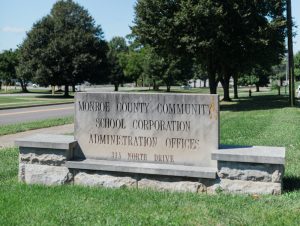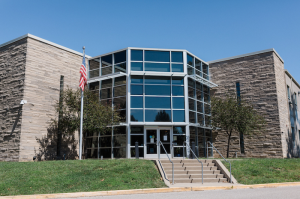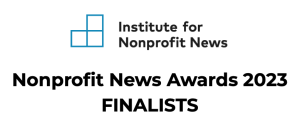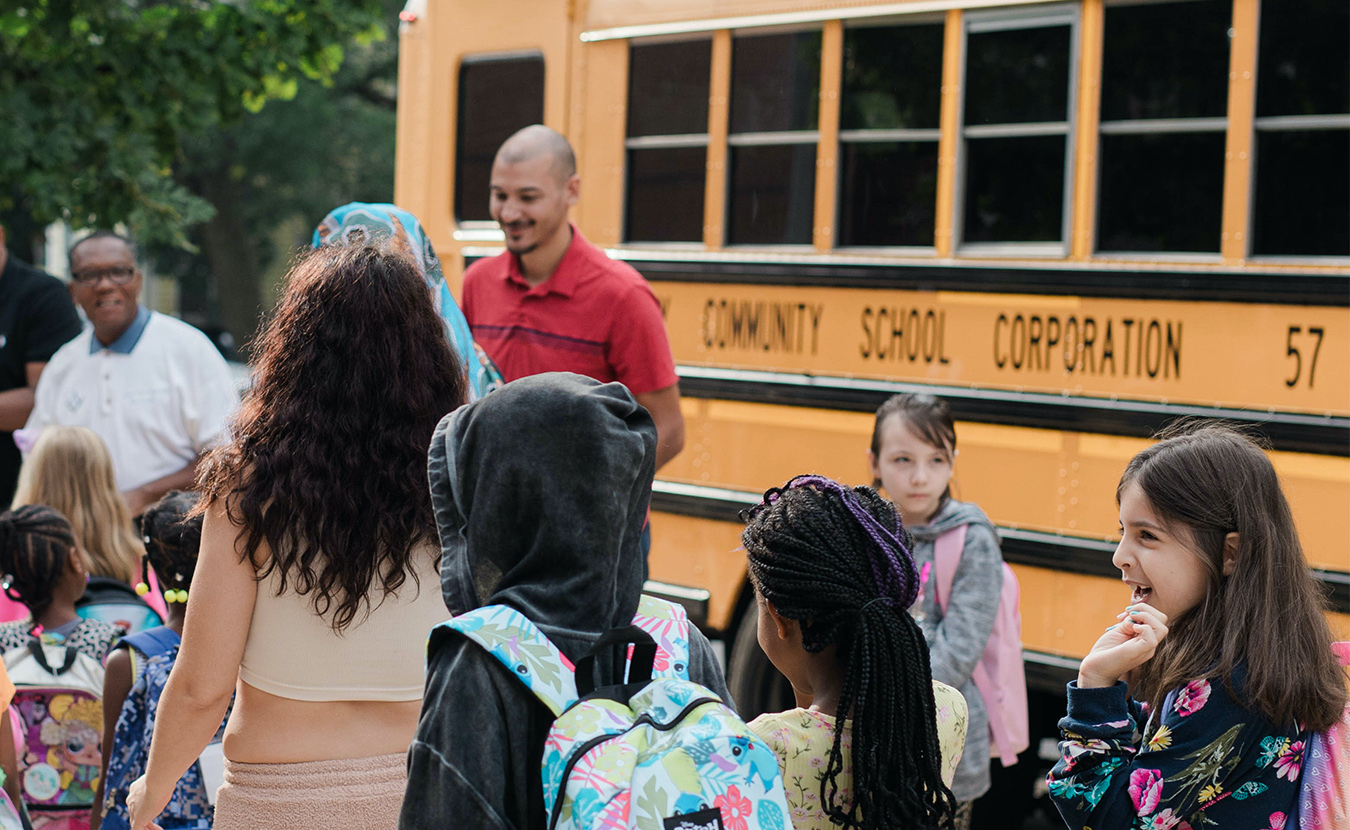Editor’s note: This is the seventh article in a series called “Deep Dive: WFHB and Limestone Post Investigate,” a collaboration between WFHB Community Radio’s Local News Department and Limestone Post, made possible by a grant from the Community Foundation of Bloomington and Monroe County. Deep Dive was chosen by the Institute for Nonprofit News as a finalist for “Journalism Collaboration of the Year” in the 2023 Nonprofit News Awards. Read more about the collaboration at the end of this article.
The start of a new school year is a time of promise and excitement, but Indiana public schools — and many students — face strong headwinds as the 2023–24 academic year gets into full swing. That’s the consensus of educators and advocates regarding this year’s session of the Indiana General Assembly.

Indiana state Senator Shelli Yoder | Photo: Indiana General Assembly website
“It feels like public education is under attack from all directions,” says state Sen. Shelli Yoder, D-Bloomington, who serves on the Senate Education and Career Development Committee.
Start with school funding. Members of the Republican supermajority point out that the two-year state budget provides record increases for K-12 education. What they don’t say is that the increases are tilted heavily to private schools, while public schools saw only modest gains.
Lawmakers also proposed a raft of bills to double down on America’s culture wars over race, gender, and other issues — what the Indiana ACLU dubbed a “slate of hate” — and passed several of them.
Fighting that legislation “took lot of energy, and I think that we’ve still not really fully recovered,” says Beth Clawson, the mother of a 10-year-old transgender daughter, who lobbied without success against legislation to ban gender-affirming care for minors.
Supporters of public education did notch a few wins. They limited the reach of some of the culture-wars bills. The budget includes money for literacy initiatives, and eligible middle-school students will be automatically enrolled in the Twenty-First Century Scholars program, which helps pay for college.
There was also a win for families. Until this year, Indiana was one of a handful of states that required parents to pay textbook fees. Gov. Eric Holcomb pushed legislators to change that, and they did. But the funding they allocated won’t cover the full cost for some districts. Jeff Hauswald, the Monroe County Community School Corp. superintendent, says MCCSC will be on the hook for up to $750,000 a year.
“This is another unfunded mandate,” he says. “It’s an underfunded mandate, really.”
Voucher program races ahead, public school funding lags
House Republican talking points say the budget includes $2.3 billion in “new money” for K-12 education. They note that K-12 schools are by far the biggest state expense in the two-year, $44.5 billion budget.
But GOP projections show funding increases for traditional public schools will fall short of recent cost-of-living growth. For Monroe County Community Schools, state funding is projected to rise by about 5.4 percent over the next two years.

Jeff Hauswald, superintendent of the Monroe County Community School Corp. | Photo by Garrett Ann Walters
“We have another situation where our funding continues to fall further and further behind inflation,” Hauswald says.
Where is the money going? More than one-third of this year’s K-12 funding increase goes to private schools, which serve fewer than 8 percent of Hoosier students, via an expansion of Indiana’s voucher program.
The voucher program was created in 2011, ostensibly to help children from low-income families find an alternative to public schools. Initially, participation was strictly limited, and students had to attend a public school for at least a year to qualify. But the rules were gradually loosened, and the program has grown. Last year it enrolled over 50,000 students in 343 private schools.
Republican legislators came to embrace the concept that state education funding should “follow the student.” If parents sent their child to a public school, a private school, or a privately operated charter school, that’s where the money would go.
This year, they expanded the private-school voucher program to families that make up to 400 percent of the limit for reduced-price school meals, $220,000 for a family of four; and they eliminated pathways that students had to follow to qualify. That makes it essentially a universal program, open to an estimated 97 percent of students.
“I’m excited to see Indiana once again stand behind our Hoosier families who want the ability to choose the best school that meets their child’s needs regardless of their zip code,” House Speaker Todd Huston, R-Fishers, said in a news release. “We’re now on our way to having the best school choice program in the country.”

(top) Indiana Speaker of the House Todd Huston; (bottom) Sen. Rodric Bray, president pro tempore of the Indiana Senate | Photos: Indiana General Assembly website
As students leave public schools for private schools, however, state funding follows, leaving public schools with fewer resources. Instead of the “general and uniform system of common schools” prescribed by the state constitution, Indiana now funds three K-12 systems: traditional public schools; over 100 charter schools, most of them privately operated; and private schools that rely on vouchers.
Studies of statewide voucher programs like Indiana’s have found that, on average, students who received vouchers fell behind academically when they left public schools for private schools, according to Michigan State University education professor Joshua Cowen. A 2018 study by researchers at the universities of Notre Dame and Kentucky found Indiana voucher students fell significantly behind on math achievement.
The Indiana Legislative Services Agency projects the state will spend $1.1 billion for private school vouchers over the next two years, more than twice as much as in the previous two years.
“The Republican majority don’t want to admit it, but they can’t do everything at the same time,” says Rep. Matt Pierce, D-Bloomington. “They can’t provide vouchers to anyone who wants one at the same time they fund public schools.”
Republican Reps. Dave Hall of Norman, Peggy Mayfield of Martinsville, and Bob Heaton of Terre Haute, whose districts include parts of Monroe County, did not reply to interview requests from Limestone Post. Senate Speaker Pro Tem Rod Bray, R-Martinsville, whose district adjoins Monroe County to the north, declined a request for an interview.
State-funded discrimination
Voucher critics also object that private schools aren’t as transparent and accountable as public schools. They don’t have to follow state open-meetings and public-records laws, and their finances aren’t subject to public audits. Most promote religion. They can reject students and employees for their religion, sexual orientation, gender identity, disability, native language, and other factors.
A 2016 academic paper on state voucher programs, including Indiana’s, sums it up in the headline: “Dollars to Discriminate.”
As the voucher program has grown, participating students have been increasingly likely to be from white and affluent families. “The big worry is, are vouchers going to be the next form of segregation: by poverty, by race, by religion,” says Hauswald, the MCCSC superintendent.

Each year on the first day of school, members of the city’s Commission on the Status of Black Males welcome students at Fairview Elementary. The event is an opportunity for “dads, uncles, grandfathers, coaches, mentors, clergy, men’s groups, and organizations to show their commitment to the educational lives of their children and children in the community,” according to the group’s website | Photo by Garrett Ann Walters
When it comes to overall K-12 funding, studies have shown that Indiana trails neighboring states. While Gov. Eric Holcomb declared last year that raising educators’ pay was a priority, a 2023 survey by the National Education Association found starting pay for Hoosier educators to be below average and Indiana per-pupil school funding to be near the bottom of the states.
Paul Farmer, president of the Monroe County Education Association, the MCCSC teachers’ union, says low pay is just one factor that puts stress on the profession and contributes to a shortage of teachers across the state. Others include the impact of the COVID-19 pandemic, the mandates that legislators keep imposing on what and how to teach, and a lack of respect from government officials.
“It’s not a single straw that broke the camel’s back,” Farmer says. “It’s all the tonnage from the big bales of hay that are put on its back.”
If there is a bright spot for public schools on the funding front, it came on the last day of the session. A supposedly final budget, agreed to by House and Senate leaders, would have provided little or no funding increase in the second year of the budget cycle; some districts would have lost money. School leaders and teachers objected and made themselves heard. In an unusual move, legislators reopened the budget and added $300 million to the K-12 funding pot.
“I think finally, with this expansion of vouchers and other policies, it’s having an impact beyond the urban schools, and you begin to have legislators from rural areas concerned,” Pierce says.
Letting the voters decide
While Indiana has been frugal about funding public schools, it has given school districts a fallback option: They can ask voters to raise their property taxes to provide extra money. The MCCSC did that last year.
Now the district is asking for another property tax increase. Why so soon?
Hauswald says the district’s 2022 funding referendum was about investing in personnel: It provided substantial raises for teachers and support staff. But it didn’t address important community and family needs, like expanding access to pre-kindergarten.

Funding for the Monroe County Community School Corp. referendum in 2022 was to increase pay for teachers and support staff. This year, the Indiana General Assembly approved only a small expansion to pre-kindergarten funding, so MCCSC is proposing another tax rate hike to provide free or affordable pre-K for all 3- and 4-year-olds and to offset the shortfall in state funding for other expenses. | Photo by Garrett Ann Walters
“This came up when we designed the 2022 referendum,” Hauswald says, “but we also were confident that, with record revenue, our state would finally fund early childhood education.”
But lawmakers approved only a small expansion of On My Way Pre-K, which helps low-income families pay for preschool, raising the income eligibility level from 127 percent to 150 percent of the limit for reduced-price school meals. Even with the expansion, Indiana remains one of six states without a comprehensive state-funded pre-K program, according to the National Institute for Early Education Research.
That’s despite decades of lobbying by early-education advocates and even recent support from influential groups like the Indiana Chamber of Commerce. In its recent Indiana Prosperity 2035 strategy document, the chamber calls for a “universal, statewide, publicly funded pre-K educational program.”
Monroe County has a demonstrated shortage of affordable, high-quality pre-K, Hauswald says. The lack of options keeps parents out of the workplace. The high cost of care is a drag on family finances. And for young children, it’s a missed opportunity to get an early start on learning.
“It’s a workforce issue, it’s a childcare issue, and it’s an education issue,” Hauswald says. “Early childhood is one of the best things we can do to increase access and opportunity. It’s equity.”
About two-thirds of the revenue from the referendum would go to provide free or affordable pre-K for all 3- and 4-year-olds, according to the MCCSC plan. The rest would offset the shortfall in state funding for textbooks and technology and cover certain course and exam fees. For example, students pay for Advanced Placement tests, and students who take career courses are charged for certification exams.
“
Private schools aren’t as transparent and accountable as public schools, don’t have to follow state open-meetings and public-records laws, and their finances aren’t subject to public audits. Most promote religion. They can reject students and employees for their religion, sexual orientation, gender identity, disability, native language, and other factors.
”
MCCSC is proposing a property tax rate increase of up to 8.5 cents in the November 7 election. Officials say the actual increase is likely to be less than half that much, because of rising property values and other factors. They say a home assessed at $250,000 would see a tax increase of $50 a year under the proposed referendum tax rate.
MCCSC voters approved previous referendums in 2010, 2016, and 2022, enabling the district to avoid cutting staff and programs. Referendums have worked for Monroe County so far, but most Indiana school districts don’t try to pass them, probably because they expect local voters would say no.
“There’s nothing equitable about school funding in the state of Indiana,” Hauswald says. “I long for the day that local communities don’t have to have referendums.”
‘Education intimidation’ bills
A high school senior was first to the mic for public comment at the August 22 meeting of the MCCSC school board.
“I shouldn’t have to fight for the right to my name, nor should my teachers have to,” said the student, who asked to be identified as Possum.
That responsibility should lie with the school district, Possum said: “You have the chance to take the lead in speaking for and representing us as a community.”
The topic for comment was House Enrolled Act 1608, often referred to as the pronoun law. It requires schools to inform a parent within five business days if a student asks to be called by a different name or pronoun. It also bans instruction in human sexuality in kindergarten through third grade — which, according to teachers and administrators, has not been taught.
“We know parents’ rights are important and they need to know what’s going on in their child’s life at school,” Sen. Stacey Donato, the legislation’s lead Senate sponsor, said during debate, according to The Statehouse File. “[Act] 1608 is about ensuring schools and parents are working together to keep their kids to be successful.”

Beth Clawson (above, center, with her family), lobbied without success against legislation to ban gender-affirming care for minors. Fighting that legislation “took lot of energy,” says Clawson, “and I think that we’ve still not really fully recovered.” | Photo by Garrett Ann Walters
For schools, the pronoun law is a massive inconvenience, forcing them to reach out to parents if, for example, a student is enrolled as Joseph and wants to be called Joe.
“This has been an excessive burden on our school administrators,” says Hauswald, the MCCSC superintendent. “It’s unnecessary, and it seems mean-spirited.”
For some transgender or gender-nonconforming students, it’s worse. It risks having them be outed to their parents, even if the parents don’t support their identity.
“I really worry,” says Beth Clawson, who advocates for trans kids and their families. “The only place those kids can be themselves is at school, and that’s being taken away from them.”
Barbara Dennis, who also spoke at last month’s school board meeting, urged the MCCSC to file a lawsuit to challenge the law. “Any other response in support of our students is only first aid — necessary but insufficient,” she told the board.
The ACLU of Indiana did sue to block HEA 1608’s ban on teaching young children about human sexuality. A judge denied the ACLU’s motion for a temporary injunction, and the organization has appealed.
In perhaps their cruelest action, legislators approved Senate Enrolled Act 480, a ban on gender-affirming care, including puberty blockers and hormones, for anyone under 18. (An ACLU lawsuit has blocked that law for now.) They also passed a law that promotes challenges to school library books as harmful to kids.
The laws are part of a national wave of “education intimidation bills,” according to a report by PEN America, which says the bills “empower the use of intimidation tactics to cast a broad chilling effect over K-12 classrooms by mandating new and intrusive forms of inspection or monitoring of schools.”
The bills don’t arise from local citizens, the group says, but are seeded by conservative think tanks and promoted in state capitals by organizations like Moms for Liberty and Purple for Parents, labeled extremist groups by the Southern Poverty Law Center.
“
Lawmakers proposed a raft of bills to double down on America’s culture wars over race, gender, and other issues — what the Indiana ACLU dubbed a ‘slate of hate’ — and passed several of them.
”
HEA 1608 started out as Indiana’s version of Florida’s controversial “Don’t Say Gay” law. Republicans broadened it to include cisgender students in an apparent attempt to head off lawsuits alleging discrimination. But it’s widely understood that the law targets trans students.

More than one-third of this year’s K-12 funding increase goes to private schools, which serve fewer than 8 percent of Hoosier students. “There’s nothing equitable about school funding in the state of Indiana,” Hauswald says. Above, the MCCSC Administrative Offices on North Drive. | Photo by Garrett Ann Walters
“We know 1608 was about forcibly suppressing and controlling people’s lives,” says Yoder, the Bloomington state senator. She calls out the contradiction between the legislation, billed as a “parents’ rights” guarantee, and SEA 480, which denies parents the right to provide treatment for trans kids.
Complicating the situation for schools, the Indiana Department of Education has not provided guidance on how to implement the name and pronoun notification requirement. “HEA 1608 does not outline a specific parental notification process that must be followed,” says department spokesperson Molly Williams. “Thus, this parental notification process is to be determined locally, if a school does not already have such a process in place.”
Hauswald says the MCCSC is “following the letter of the law,” telling parents if there’s any change from the name on a student’s enrollment record. He emphasizes that parents are notified but not asked to approve a name or pronoun change. MCCSC is notifying parents using a form letter that emphasizes the district’s commitment to “a safe, respectful and inclusive learning environment in which student diversity and identities are celebrated.”
“Our main objective,” says Greg Chaffin, a counselor at Bloomington High School North, “is to make sure that, despite this law, every one of our students has an advocate here for who they are, that every student feels they belong and they are cared about and they receive the same education as their peers.”
But he worries the law can have “a chilling effect on how kids feel about who they are and whether they are worthy.”
Librarians as pornographers

Indiana state Rep. Matt Pierce | Photo by Benedict Jones
Advocates also use “chilling effect” to describe the likely impact of HEA 1447, which takes effect January 1, 2024. “In my opinion that is the most widespread and problematic impact of the whole thing,” says Pierce, the Bloomington state representative.
The law prohibits schools from providing students with materials that are obscene or “harmful to minors,” although there’s no evidence that they do. It requires school corporations and charter schools to post online lists of all the books in their libraries and print the lists for those who request them.
Schools also must establish and publicize a procedure for parents or community members to petition for removing books. Finally, the law says educators charged with providing obscene or harmful materials can no longer defend themselves with a claim that the materials are educational.
“Parents have a right to know what their children are reading in school, and this new law does that while increasing transparency in our schools,” Sen. Mark Messmer, R-Jasper, said in a news release.
But educators see problems with the law. “I think teachers will probably become more and more conservative about what books they do provide because they simply don’t want the hassle of having to go through this,” says Farmer, the MCCSC teachers’ union president.
Chad Heck, co-chair of the Indiana Library Federation advocacy committee, says the legislation could have been worse. Most school libraries, he says, already have their catalogs online and should be able to print them if requested. Also, most have a policy for challenging reading materials “that’s actually more comprehensive than is required under this law.”

“We really believe decisions on what people read should be left to families rather than legislators,” says Chad Heck, co-chair of the Indiana Library Federation advocacy committee. “Censorship is a concern in our state, and it continues to be a concern.” | Courtesy photo
Heck, a librarian at Pike High School in Indianapolis and an attorney, says school libraries don’t have materials that meet the legal definition of being obscene or harmful to minors. But the people pushing the legislation, including some lawmakers, seem convinced they do. Testifying at the Statehouse this year, Heck was repeatedly called a pornographer by the bill’s supporters.
“We really believe decisions on what people read should be left to families rather than legislators,” he says. “Censorship is a concern in our state, and it continues to be a concern.”
While the final version of the legislation doesn’t cover public libraries, Heck says they will be affected by the conservative push to restrict what young people read. He points to the recent controversy at Hamilton East Public Library in Fishers, where over 1,000 young adult books were reshelved in an adult section, including the popular novel “The Fault in Our Stars,” by Indianapolis author John Green.
“This is going to impact libraries around the state, and it is impacting some libraries already,” Heck says.
On the positive side, Heck is pleased the budget includes $6 million to implement the Dolly Parton Imagination Library, which the country music star established to provide free books for young readers.
“The early access to books for very young children,” he says, “that’s had such an impact in other states. We’re excited that Indiana is now on board.”
An uncertain future
The dust hasn’t settled on the 2023 session of the legislature, but the 2024 session is coming up in just four months. Will it be more of the same regarding education, or something different?
Pierce notes that legislative leaders didn’t assign a single education topic to this year’s interim study committees, normally a key step in preparing bills. He sees that as a hopeful sign.
“I think that perhaps the Republicans are just getting education fatigue,” he says. Anyway, the GOP has achieved its primary ideological goal: a universal private-school voucher program. And it’s here to stay. “Once you create an entitlement, it’s difficult to remove it,” Pierce says.
Next year will be an important election year, however: for governor, for all the state House districts and half the Senate districts, and for local school boards. Elections ratchet up the partisanship, and Hoosier lawmakers have a record of using provocative legislation to motivate voters.
Also, the groups that pushed for what critics called “book banning” and “don’t say gay” legislation fell short of getting everything they wanted.
“We’re not done yet,” Yoder predicts. “We’re going to see some of that legislation again.”
For Beth Clawson, whose transgender daughter just started fifth grade, the prospect of more state legislation targeting LGBTQ+ kids and their families is deeply personal.
“As a family, we worked so hard to create a community that we love and that loves us,” she says. “We don’t want legislators pushing us out or pushing anyone out. That said, if it ever becomes impossible for us to provide the care that our daughter needs, we will leave in a heartbeat.”
 Deep Dive: WFHB & Limestone Post Investigate
Deep Dive: WFHB & Limestone Post Investigate
The award-winning series “Deep Dive: WFHB and Limestone Post Investigate” is a journalism collaboration between WFHB Community Radio’s Local News Department and Limestone Post Magazine. Deep Dive debuted in February 2023 as a year-long series, made possible by a grant from the Community Foundation of Bloomington and Monroe County. The Community Foundation also helped secure a grant from the Knight Foundation to extend the series for another year.
In the series, Limestone Post publishes an in-depth article about once a month on a consequential community issue, such as housing, health, or the environment, and WFHB covers related topics on Wednesdays at 5 p.m. during its local news broadcast.
In 2023, Deep Dive was chosen by the Institute for Nonprofit News as a finalist for “Journalism Collaboration of the Year” in the Nonprofit News Awards held in Philadelphia. And this year, the series brought home seven awards from the “Best in Indiana” Journalism Contest by the Society of Professional Journalists. Read more about the awards.
Here are all of the the Deep Dive articles and broadcasts so far:
Housing Crisis
Limestone Post article by Steve Hinnefeld, published February 15, 2023:
Deep Dive: Struggling with Housing Supply, Stability, and Subsidies, Part 1
WFHB reports:
Steve Hinnefeld won 1st place for “Non-Deadline Story or Series” in the Indiana Pro Chapter of the Society of Professional Journalists “Best in Indiana” Journalism Contest for parts 1 and 2 of this housing series. The staff of WFHB won 2nd place for “Coverage of Social Justice Issues” for its programs “Deep Dive: Housing Crisis.”
Housing Crisis Solutions
Limestone Post article by Steve Hinnefeld, published March 15, 2023 | photography by Jim Krause
‘No Silver Bullet’: Advocates, Officials Use Many Tactics on Housing Woes
WFHB reports:
Opioid Settlement Fund Investigations
Limestone Post article by Rebecca Hill, published April 12, 2023 | photography by Benedict Jones
How Will Opioid Settlement Monies Be Spent — and Who Decides?
WFHB reports:
IU Tree Inventory
Limestone Post article by Laurie D. Borman, published May 17, 2023 | photography by Jeremy Hogan
Trees Do More Than Add ‘Charm’ to IU Campus
WFHB reports:
Indiana Power Grid
Limestone Post article by Rebecca Hill, published June 21, 2023 | photography by Benedict Jones
The Power Struggle in Indiana’s Changing Energy Landscape
Rebecca Hill won 1st place for “Medical or Science Reporting” in the Indiana Pro Chapter of the Society of Professional Journalists “Best in Indiana” Journalism Contest for this article.
WFHB reports:
Lake Monroe Survival
Limestone Post article by Michale G. Glab, published August 16, 2023 | photography by Anna Powell Denton
How Healthy Is Lake Monroe — and How Long Will It Survive?
Michael G. Glab won 3rd place for “Business or Consumer Affairs Reporting” in the Indiana Pro Chapter of the Society of Professional Journalists “Best in Indiana” Journalism Contest for this article.
WFHB reports:
Indiana Lawmakers Attack Public Schools
Limestone Post article by Steve Hinnefeld, published September 13, 2023 | photography by Garrett Ann Walters
Local Parents, Educators Face ‘Attack’ on Public Schools from Indiana Lawmakers
WFHB reports:
On Saving the Deam Wilderness
Limestone Post photo essay by Steven Higgs, published October 18, 2023
On Saving the Deam Wilderness and Hoosier National Forest | Photo Essay
Steven Higgs won 2nd place for “Multiple Picture Group” in the Indiana Pro Chapter of the Society of Professional Journalists “Best in Indiana” Journalism Contest for this photo essay.
WFHB reports:
Food Insecurity, Part 1
Limestone Post article by Christina Avery and Haley Miller, photography by Olivia Bianco, published December 18, 2023
One Emergency from Catastrophe: Who Struggles with Food Insecurity?
Christina Avery and Haley Miller won 1st place for “Coverage of Social Justice Issues” in the Indiana Pro Chapter of the Society of Professional Journalists “Best in Indiana” Journalism Contest for this article.
WFHB reports:
Food Insecurity, Part 2
Limestone Post article by Christina Avery and Haley Miller, photos by Olivia Bianco, published March 13, 2024
‘Patchwork’ of Aid for Food Insecurity Doesn’t Address Its Cause
WFHB report:
What’s at Stake in the Debate Over Indiana’s Wetlands
Limestone Post article and photos by Anne Kibbler, published May 15, 2024
What’s at Stake in the Debate Over Indiana’s Wetlands?
WFHB reports:
- Wetlands (Part 1), May 22, 2024
- Wetlands (Part 2), May 29, 2024
- Wetlands (Part 3), June 7, 2024
- Wetlands (Part 4), June 12, 2024
Resilience Amid Hardship: Refugees Find Challenges, Opportunities in Bloomington
Limestone Post article by by Brookelyn Lambright, Karl Templeton, and Brenna Polovina from the Arnolt Center for Investigative Journalism, published August 1, 2024
Resilience Amid Hardship: Refugees Find Challenges, Opportunities in Bloomington
WFHB reports:
- Refuge in Indiana (Part 1), August 7, 2024
- Refuge in Indiana (Part 2), August 14, 2024
- Refuge in Indiana (Part 3), August 21, 2024
- Refuge in Indiana (Part 4), August 28, 2024
Apprenticeships Work for Some High School Students But Not All
Limestone Post article by Steve Hinnefeld, photography by Benedict Jones, published September 24, 2024
Apprenticeships Work for Some High School Students But Not All
WFHB reports:
- Apprenticeships (Part 1), October 9, 2024
- Apprenticeships (Part 2), October 16, 2024
- Apprenticeships (Part 3), October 30, 2024
Goal of BPD and Social Support Team Is ‘To Help People’
Limestone Post article by Haley Miller, published November 26, 2024
Goal of BPD and Social Support Team Is ‘To Help People’
WFHB reports:
- Police and Social Work, January 29, 2025
- Police and Social Work (Part 2), February 5, 2025
- Police and Social Work (Part 3), February 26, 2025
Political Polarization Hurts Communities — What Can Be Done?
Limestone Post article by Marjorie Hershey, photos by Jeremy Hogan/The Bloomingtonian, published January 26, 2025
Political Polarization Hurts Communities — What Can Be Done?
WFHB reports:




